COVID-19 Pandemic information
Toolkit for WWOOF Hosts and WWOOFers to ensure safety whilst WWOOFing.
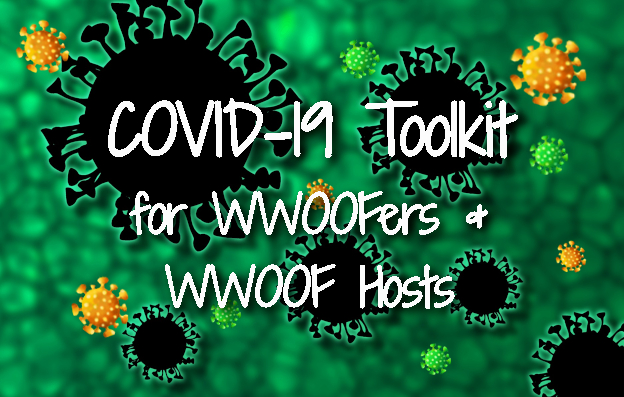
Each State in Australia has different levels of restriction at different times, many state borders are closed.
For up to date information on Border closures and permits required, see: interstatequarantine.org.au/state-and-territory-border-closures/
January 2022 Update
The Australian Government has offered to refund visa fees for Working Holiday visa holders who arrive in Australia within 12 weeks and Student visa holders who arrive in Australia within 8 weeks of their announcement on 19th January 2022. They have also removed the 20 hour paid work cap for Student visa holders.
December 2021 Update
New arrangements for fully vaccinated, eligible visa holders
From 15 December 2021, fully vaccinated eligible visa holders can travel to Australia without needing to apply for a travel exemption. This includes eligible visa holders in Australia seeking to depart and return.
To WWOOF, and be considered an eligible visa holder you must hold one of the following visas. If you have applied for the visa but it has not yet been granted, you are not an eligible visa holder.
- Subclass 417 – Working Holiday visa
- Subclass 462 – Work and Holiday visa
- Subclass 500 – Student visa
For a full list of eligible visas, and further details about proof of vaccination required etc. see covid19.homeaffairs.gov.au/vaccinated-travellers
You may also be able to travel to Australia without seeking a travel exemption if you are fully vaccinated and you are automatically exempt from Australia’s travel restrictions, or if you are travelling to Australia under a safe travel zone arrangement.
All other people seeking to travel to Australia must apply for a travel exemption.
If you are coming to or from Australia you can check what you need to do before you travel by following the below guides:
- Preparing to leave Australia
- Preparing to travel to Australia from overseas.
Travel restrictions and exemptions
Other than the above eligible, fully vaccinated travellers, travel to Australia is only available if you are exempt or you have been granted an individual exemption.
Travel restrictions are subject to change in response to the circumstances surrounding COVID-19. You can stay informed with all exemption categories and the latest updates by checking this page regularly.
Quarantine and local requirements
Travellers to Australia need to comply with requirements in the state or territory of their arrival, and any other state or territories that you plan to travel to. This includes quarantine and post-arrival testing requirements. Restrictions may change at short notice.
Quarantine requirements in Australia are determined by State and Territory governments.
If you wish to travel on to another state or territory you may not be allowed to enter, or may be subject to a quarantine period.
It is your responsibility to ensure that you meet entry, quarantine and post-arrival testing arrangements for each state or territory that you intend to travel to. You may be responsible for costs of quarantine if you arrive in a state or territory without meeting entry requirements.
To check requirements, see State and Territory Information for travellers.
Farms are essential businesses and WWOOFers are essential workers
WWOOF Australia requested definitive information for Hosts and WWOOFers regarding the legality of WWOOFers traveling to and staying with Hosts. This letter is the response from the Minister for Agriculture.
Non-essential travel is not allowed in areas under lockdown restrictions, so it is important to keep up with the latest information on which areas are under lockdown, the specific level of restrictions in the area you are in or plan to go to and which state borders are closed. There are large fines for crossing closed borders without a permit, or for breaching lockdown conditions. Please do not leave a lockdown area to travel to a WWOOF Host without first self- isolating for 14 days and taking all necessary precautions on route.
In states where there are few or no cases of COVID-19, social distancing and hand sanitizing practices continue to be strongly recommended.
If you are in a State or area that is under strict lockdown restrictions, you will need to follow the current rules for the lockdown in your area. If you need to check, the COVID-19 Restriction checker may help
WWOOF Australia understands that WWOOF hosts in lockdown areas may currently have WWOOFers or be actively welcoming WWOOFers. We are asking hosts to allow WWOOFers to shelter in place on arrival, practice physical distancing and self-quarantine, as necessary.
WWOOFers are seeking ways to participate in a meaningful way on organic farms, learn to grow their own food, and live more sustainable lives, now more than ever. If you are not a member yet and want to take a look at the kinds of WWOOFing opportunities available, or want to learn more about farm availability, please see the List Search to see the basic profiles of WWOOF Hosts. WWOOF Members can also use the Map search and WWOOF Noticeboard for Hosts urgently looking for WWOOFers.
Join WWOOF and set up your own WWOOFer Volunteer Profile if you wish to contact host farmers. Please discuss any concerns you have with hosts or WWOOFers before arrival.
With travel restrictions changing daily, it is advisable to keep updated regarding the situation in Australia by referring to the australia.gov.au/ coronavirus page and we ask that you stay in compliance with all local, state and federal rules.
We thank you for all you are doing to help support farmers and travellers safely, build strong communities and help grow a more sustainable future.
Please contact WWOOF Australia with any questions, or call us on 0455 023 173 during office hours.
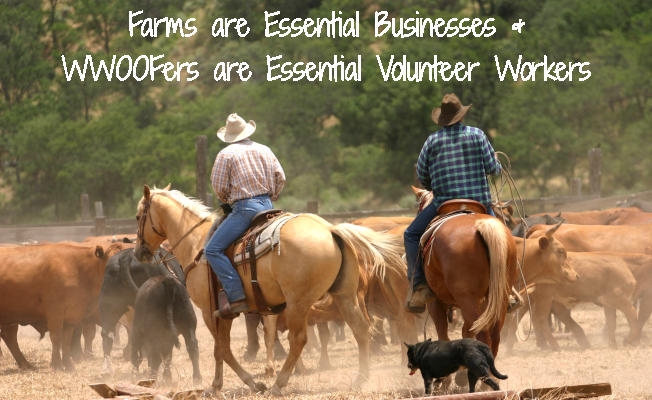
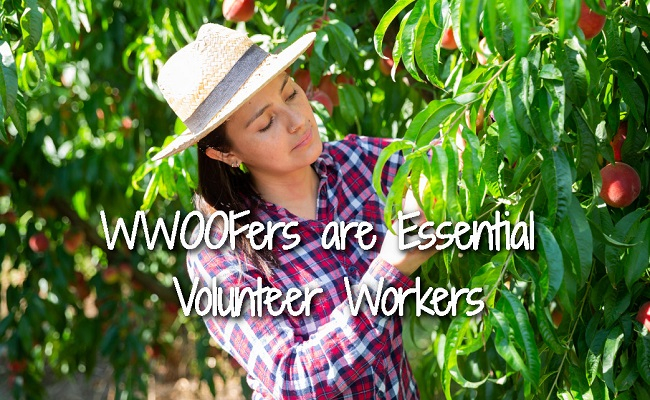
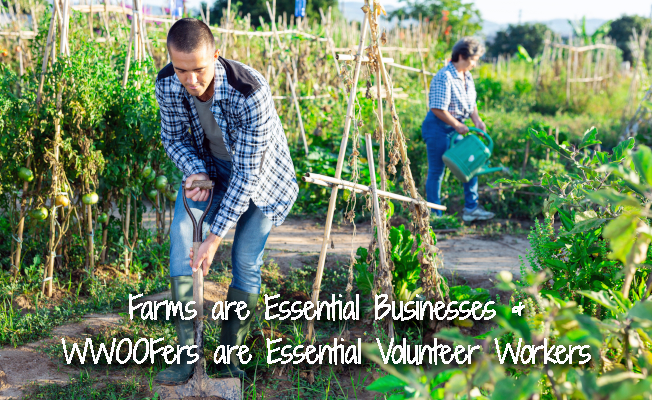
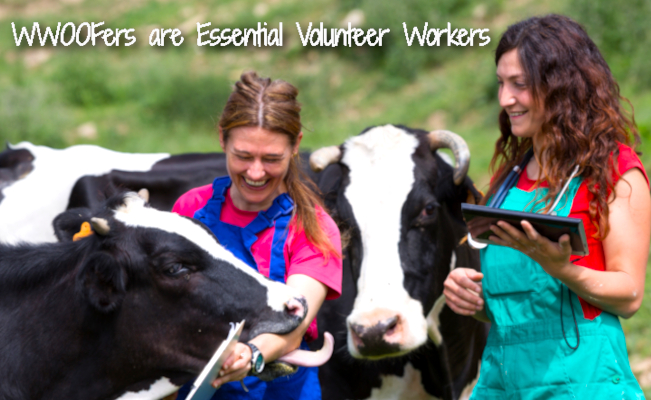
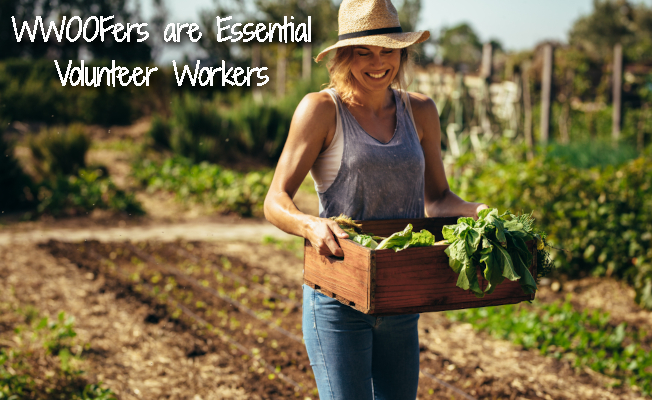
November 2021 Update
COVID restrictions are easing and phasing out in most states as vaccination levels increase, with State and International borders predicted to be reopening soon.
We recommend all WWOOF members comply with the current COVID-19 Pandemic restrictions that are in force in their State or Territory.
For up to date information on Border closures and permits required, see: interstatequarantine.org.au/state-and-territory-border-closures/ If you are in a State or area that is under strict lockdown restrictions, you will need to follow the current rules for the lockdown in your area. If you need to check, the COVID-19 Restriction checker may help.
25th November: Victoria’s travel permit system has been scrapped after the state reached its 90 per cent double vaccination target for those aged 12 and over, border permits are no longer required for travel into Victoria.
Tougher COVID restrictions may be in place in some areas from time to time, and we ask our Volunteers to make sure they fill in the correct paperwork for any permits which may be required in their State or Territory, along with Essential WWOOF Volunteer Certification that both Hosts and WWOOFers must have filled in before travelling to a Host property.
See the WWOOF COVID-19 Toolkit page for more information and links.
For up to date information on Border closures and permits required, see: interstatequarantine.org.au/state-and-territory-border-closures/ If you are in area that is under strict lockdown restrictions, you will need to follow the current rules for the lockdown in your area. If you need to check, the COVID-19 Restriction checker may help.
October 2021 Update
Tougher COVID restrictions have been announced in various states and we ask our Volunteers to make sure they fill in the correct paperwork for any permits required in their State or Territory, along with Essential WWOOF Volunteer Certification that both Hosts and WWOOFers must have filled in before travelling to a Host property.
Non-essential travel is not allowed in areas under lockdown restrictions, so it is important to keep up with the latest information on which areas are under lockdown, the specific level of restrictions in the area you are in or plan to go to and which state borders are closed.
NSW Restrictions
NSW is under lockdown restrictions. For all NSW COVID-19 updates and advice see: nsw.gov.au/covid-19/rules and dpi.nsw.gov.au/home/covid-19
For NSW border crossing advice see: dpi.nsw.gov.au/home/covid-19/border-crossing-information and nsw.gov.au/covid-19/rules/interstate-hotspots
NSW Agriculture Minister Adam Marshall said new exemptions would allow critical agricultural employees to pass across the border for work — regardless of whether they lived in the border bubble or not — although it is limited to a distance of 100 kilometres north of the border. Bushfire Recovery workers are included in the list of critical workers.
Please use WWOOF Australia’s Bushfire Recovery Certification documentation which is required to cross the Victorian border into NSW. Bushfire Relief Workers will need to also apply for a ‘Highly Specialised Critical Services (Agriculture) Permit‘ through Service NSW. This WWOOF Certificate and the Permit must be presented at the border with photo ID.
ACT Restrictions
ACT is under lockdown restrictions. For all ACT COVID-19 updates and advice see: covid19.act.gov.au/
as at 1st September, the ACT’s lockdown measures will be extended until midnight on Friday 17 September due to the ongoing public health risk in the Territory.
Victorian Restrictions
Victoria is under Lockdown Restrictions, this varies from region to region and Permits must be issued to allow WWOOFers to travel to Commercial WWOOF Hosts, with an ABN. For all Victorian COVID-19 information see: coronavirus.vic.gov.au/
On the 1st of October 2021 Premier Daniel Andrews announced all Authorised workers, must have received at least one dose of a COVID-19 vaccine by October 15 in order to continue working on site, this includes volunteers. The same group of workers must have received two doses by November 26 to remain working on site. See coronavirus.vic.gov.au/information-workers-required-be-vaccinated for more information.
Authorised Worker Permit update August 2021
Authorised workers living in metropolitan Melbourne are currently required to carry employer-certified permits when working and travelling for work. Victorians living in regional Victoria and entering metropolitan Melbourne for authorised work must also carry a permit. Employers must keep a record of all Authorised Worker Permits they have issued. Find the Authorised provider and authorised worker list on the coronavirus website.
For information about permitted workplaces in the agriculture, forestry and fishing sector operating under Victoria’s restrictions see: Agriculture forestry & fishing restrictions COVID-19
Employers who require staff to attend a permitted workplace must issue an individual worker permit to their employees. Visit the Specified Worker Scheme and worker permits page to find out more information and for the Permit form to fill in for WWOOFers. The Permit must be signed by both the WWOOFer and Host and be presented on request when travelling to a Host Property. There are large fines for travelling without a permit, Apply for a border-permit here.
Queensland Restrictions
Queensland has various restrictions in place as well as border closures, for all information, please see: covid19.qld.gov.au/government-actions/roadmap-to-easing-queenslands-restrictions
WWOOFers COVID-19 Toolkit
Each farm is unique and WWOOFers should assess the best way to stay safe given those circumstances. Below are some examples of the recommended health and safety precautions to safely visit WWOOF hosts at this time.:
- WWOOFers should not travel if feeling symptomatic or ill.
- WWOOFers should bring their own hand sanitiser, gloves and masks.
- Practice recommended hygiene practices and social distancing.
- WWOOFers should practice physical distancing/self-isolation for two weeks prior to their departure for the farm and while on route to the host property,
- Upon arrival at the farm, WWOOFers should stay in separate accommodation and make their own meals for two weeks in order to practice physical distancing/self-isolation.
- Only engage with Hosts outdoors on the farm while practicing physical distancing for the first two weeks of their stay.
- After the first 2 weeks WWOOFing can resume as normal, while continuing to exercise good hygiene and social distancing practices.
- Make this time fun! Send us a video or photos of your creative ideas to make social distancing work for you and we will share the best ones here and on Facebook!
- WWOOF recommends that WWOOFers stay on the farm if possible, to avoid any non-essential travel.
- We encourage WWOOFers opt for long term stays to limit WWOOFer turnover & travel.
The following information is from the Department of Agriculture website:
Working Holiday Makers (WHMs) who work in agriculture or food processing will be:
- exempt from the 6-month limit on work with the 1 employer
- eligible for a further visa to keep working in these critical sectors if their current visa is due to expire in the next 6 months.
Meeting workforce principles
- All visa holders must meet all current state and territory requirements. These cover self-isolation, social distancing, hygiene and appropriate accommodation.
WWOOF Host COVID-19 Toolkit
- Hosts should not invite WWOOFers to stay if feeling symptomatic or ill, or if they have vulnerable family members who may be put at serious risk.
- Provide separate accommodation and meal preparation area and food for WWOOFers for two weeks in order to practice physical distancing.
- Try to create a pleasant area where WWOOFers can spend their free time while isolating, offer some suggestions for walks on the property,
- Provide magazines, organic farming/gardening books or magazines,DVDs, board games, cards etc.
- Ensure hand sanitiser, gloves and masks are available for WWOOFers.
- Make sure your WWOOFers understand how they can contact you if they have any concerns or questions.
- Prepare a folder with information for your WWOOFers to welcome them on arrival, be sure to include emergency contact information and any local information you feel would assist them to feel at home. This can be an incredibly stressful time for travellers, so making them feel safe and welcome on arrival can set the tone for a wonderful, if challenging, experience.
- Only engage with WWOOFers outdoors on the farm while practicing physical distancing for the first two weeks of their stay.
- Be creative and make this time fun, play charades and use other methods of communication, such as facetime, messaging etc. Be connected, but distant!
- Make a video or take photos of any great ideas and share them with us, we will share the best ideas here and on Facebook.
- Set up a list of tasks for WWOOFers that you can email or message to your WWOOFers, be creative! Use a whiteboard or blackboard.
- After the first 2 weeks WWOOFing can resume as normal, however it remains important to exercise good hygiene and social distancing practices.
- We encourage both Hosts to opt for long term stays to limit WWOOFer turnover & travel.
The following information is from the Department of Agriculture website:
Work safety for farmers and agricultural workers
- Agricultural workers often work and eat, and sometimes live, close to each other. This can increase their risk of exposure to COVID-19.
- Employers must take care of the health and safety of their workers and others at the workplace. This includes putting in place control measures to minimise the spread of COVID-19.
- You must put in place these control measures, even if they result in delays to your production.
See how farmers and agricultural workers can minimise the risk from COVID-19 (Safe Work Australia
Useful COVID-19 Links
The Department of Home Affairs provides the following information for visa holders:
- Staying in Australia during the COVID-19 Pandemic.
COVID-19 Pandemic information
- World Health Organization(WHO)
- Which Australian state borders are closed now & individual state restricions information
- Tourism Australia Information for Travellers and Australians com/en/travel-alerts/coronavirus
- Australian Government Department of Health. has a Series of Coronavirus Resources including the following:
- Coronavirus (COVID-19) – Resources
- Coronavirus (COVID-19) – Social Distancing
- Coronavirus (COVID-19) – Information for Travellers
- Coronavirus COVID-19 – Information for International Travellers
- Coronavirus (COVID-19) – Isolation guidance
- Coronavirus (COVID-19) – Information about returning to your community
If you are concerned you can call the National Coronavirus Helpline 24 hours a day, seven days a week.1800 020 080 for information and advice about COVID-19. If you require translating or interpreting services, call 131 450.
Travel restrictions affecting WWOOFers who are not yet in Australia
Australia’s international borders are currently closed to international travellers and visas are not being issued, with the exception of returning Australian citizens and, after October 2020, quarantine-free arrivals from New Zealand (see update below). There may be some phased international travel allowed in 2021 and 2022. Currently all other arriving travellers are being taken directly to Government mandated hotels for 14 days quarantine at the traveller’s expense, approximately AUD $3000 per person. This situation is changing constantly depending on the situation with the pandemic, for up-to-date information, see smartraveller.gov.au/COVID-19/travel-zones
Update August 2021
Quarantine free travel between Australia and New Zealand has been suspended for at least 8 weeks, for more information see: smartraveller.gov.au/destinations/pacific/new-zealand
Update April 2021
Travel from Australia to New Zealand
Following a decision by the Government of New Zealand, you can now travel from Australia to New Zealand without needing to quarantine on arrival. The new arrangement came into effect at 11:59pm on 18 April 2021.
For all details and conditions, see smartraveller.gov.au/COVID-19/travel-zones
Update October 2020
Travel from New Zealand to Australia
Quarantine-free travel from New Zealand to Australia commenced in October 2020. Read more about the New Zealand travel zone on the Department of Home Affairs website.
For all details and conditions, see smartraveller.gov.au/COVID-19/travel-zones
WWOOF Australia honours the ongoing cultural and spiritual connections, heritage, customs and beliefs of Aboriginal people, and pays respect to Elders past and present.

